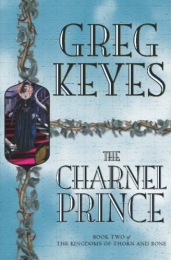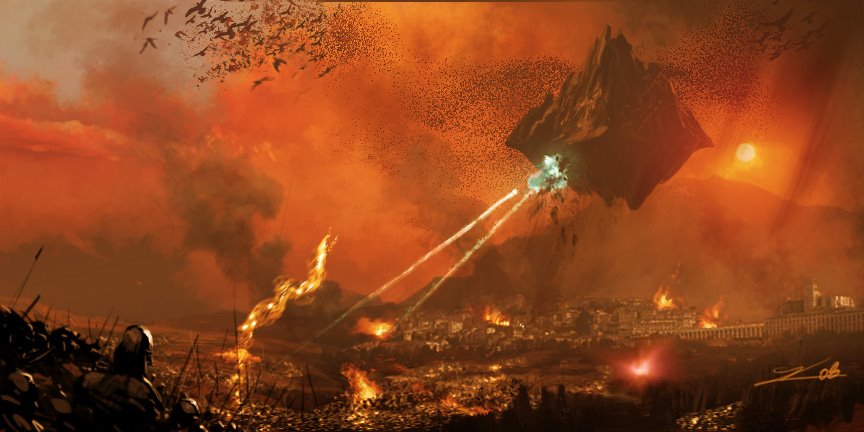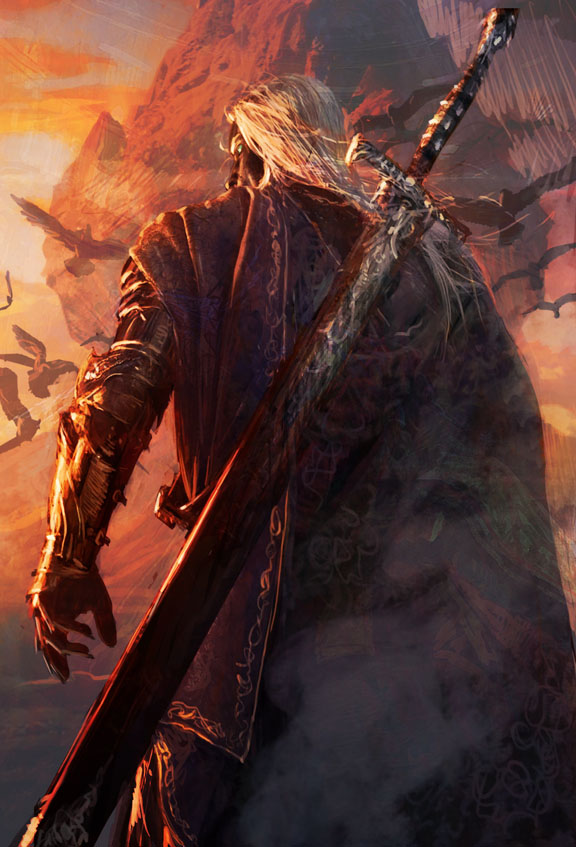 The story so far:
The story so far:
It’s a tale of two warring factions. It starts in the middle of the campaign of a Roman-like empire ruled by a mysterious empress, moving to expand her territorial control beyond what’s reasonable. The other faction being the “free cities”, who form an alliance to try to fight back and preserve their independence. Two opposed groups. The rest of the plot is about the insane proliferation of sub-factions.
Each of these two big groups is divided into a number of internal factions, with their own hidden history and plans, often not aware (or completely aware) of each other, often not even aware of where they stand. From there rises the emergent complexity of Erikson’s world. And not only we have a number of factions criss-crossing each other, but then even the gods enter the fray. Adding more foreshadowing, mystery and forgotten history. Everyone messes with everyone else. With the added principle at the foundation of it all: power draws power.
The result? A convergence. There’s a high number of sub-threads in the plot due to the interaction of these many factions, all converging to a point. Not only conceptually, but also geographically. Thankfully Erikson is coherent, so everything is well explained and makes sense, and the reader has the feel already halfway through the book that everything is moving exactly toward that point, and that it’s gonna be a real mess.
That’s the structure of the book. A really good structure. It starts with a bang, a powerful scene that is admirably handled (first you see the gruesome aftermath, then you are brought right there). Then there’s the calm after the storm, and, for the 500 pages between that first part and the climax, Erikson meticulously builds up his dominoes just so he can blow everything up later in a handful of pages.
While it moves on, there’s a whole lot of showmanship. Fireworks. So much that maybe you can find them a bit too excessive. So much stuff, characters and plots are presented that they could easily fit a fat trilogy. Still, the book doesn’t feel like moving too fast, because you know that all it happens isn’t resolutive but just another step toward the final reckoning.
There’s a guy half Marilin Manson, half Sephiroth from Final Fantasy 7, who goes around sitting on his moon-shaped airship. There’s a Jaghut Tyrant, who lifts his index and a volcano rises out the earth, that flicks his thumb and turns everything to ashes. Armies of zombies (kinda), all kinds of weird creatures like flying insects used as helicopters, a winged monkey, a chaos-powered wooden puppet. There are named swords with particle effects, powerful mages, a fool who walks through dreams, demons, dragons, other dimensions, gods.
Continuously, powerful forces who can destroy and enslave worlds are quoted. You think that this scenario is complete? That these are the “villains”? No, because before the end you discover that the forces at play are just “diversions”, and that bigger players are entering as well.
Now, I deliver death.
An endless stream of “you’ve seen nothing yet” and it almost feels like the Dragonball of fantasy literature.
But don’t get me wrong, because all of this is awesome. The worldbuilding is consistent, gritty and realistic. It has a strong sense of wonder, but it doesn’t slip on it and it’s probably the best setting ever. Brave and ambitious. Inspired and visionary. There’s attention to the different cultures and how all these uncommon aspects can affect what’s around them. The concept of gods walking among men is about how the perception of people change, when they know that gods aren’t an abstract, dubious ideas, but they are concrete, and affect visibly the world around you.
As with Tolkien, there’s history to the world going back for thousands of years. Unlike Tolkien, history here isn’t just a distant horizon, but instead comes back to take its toll. And knowing history means having an advantage, being ahead of your enemies. Gods, being immortal, have patience. Men, being mortal, are continuously on the edge.
On top of all this goodness, if you like its taste, there are a number of flaws. I often read complaints on the forums and now I can comment with my own experience. For the most part those flaws exist, but are marginal details that don’t get in the way. On the other side there are certain aspects that are more relevant.
To begin with, Erikson uses a tone that doesn’t change much through the whole book. For Glen Cook this worked because he used a single POV, for Erikson this works less, because he offers the POV of just about everything, included anthropomorphic animals that appear a bit silly. With so much display of power it is counterproductive to show every POV because you diminish the sense of wonder and have a normalizing, flattening effect on everything. The “flat” tone also makes the “voices” of all characters also flat, so making them all too much alike.
This gets worse as it loses a lot of the charisma of the characters and the novel feels distant. You aren’t easily drawn in as you fail to understand and sympathize with the characters. You always feel a separation and this works against the interest when powerful scenes are depicted. They kinda happen, they are pretty, showy, but fall a bit short because of the lack of emotional involvement.
Another flaw is that Erikson is abrupt with descriptions. When he says someone is “tall and lean” then he’s already giving out too much. All the characters seem a bit like black shapes, not because they lack a distinctive characterization, but because Erikson doesn’t linger to explain and describe. He moves on, only handing out a couple of words every hundred pages. The characterization is actually there and works, but you have to extrapolate it by yourself.
This is painfully obvious if you come from reading something like Abercrombie. In that case every phrase and word is carefully studied to give a particular feel of a character. Detail. Emergence. Here the grand scope and ambition makes characters cower. They are crushed by the plot.
There’s a love story hidden in the book that is completely developed in the background. A lot of readers complained it doesn’t make sense. The truth is that it’s very consistent, but it happens in ellipsis. It’s veiled. Like the rest of the characterization, you have to infer it. And for most readers this just means that it never happened, as it was never clearly exposed.
These two (flat tone and weak characters) are the two biggest complaints. I recognize the first as a flaw, but the second is more a choice of the writer than a flaw. In the case of the love story there was so much going on that exposing it would disrupt the pace of the book with a scene completely inappropriate. That love story represents a plot shift, but it was outside the themes of the book. And, thinking about it, Erikson dealt with it in the best way possible.
Another minor flaw I recognize is about the Deus Ex Machina. There’s a whole lot of it. I see how people are gonna hate this, but for the most part, it’s excused in the plot. Deus. Gods. In this book there are gods. They exist as part of the plot. They bend the plot as they like. They ARE Deus Ex Machina. Because they can.
This is actually one of the best realized aspect of the book. In Greek mythology gods were personifications and projections of human weaknesses, desires, ambitions and so on. Erikson takes inspiration from that. Gods weigh in everyday life, they are characters themselves, involved directly in the plot and not just abstract entities. Erikson has all of this, but his way is unique and charming in its own way.
The gods in this book intervene in everyday life in subtle ways. For example there’s the classic scene of someone who suddenly sees a coin on the ground, crouches to grab it, and doing so dodges a dart shoot by an assassin. A so classic scene that is completely ineffective and unbelievable. Ruins the consistence. But here it’s not a coincidence. It’s not chance, it’s Chance. It’s a god manipulating things.
What makes all this interesting and unique is that these gods don’t just intervene in subtle ways, pulling threads as they like, but that they are promptly detected by “normal” people who use magic. These characters can sense the presence and activity of the god, so discover who’s moving things behind the scenes. What makes this so interesting is that, while detected, the presence of the god isn’t directly explained. People can detect gods but can’t detect their intentions. And all this leads to a kind of passive observation filled with fears, because if a god is there and is meddling, then no good things can come out of it. Power draws power and soon it will be a mess for everyone. And if you want to live, you have to anticipate the gods’ moves.
It’s like a labyrinth. You on a side, a god (minotaur) from the other. You can’t see through walls, so you can’t see where the minotaur is moving. But you KNOW it’s there, and you have to find the exit all the while avoiding to face the minotaur.
This means that for the most part the Deus Ex Machina is inside the plot itself, and not an external intervention of the writer. But there’s also a part, 2/3 into the book, and then the end itself, with a row of fortuitous encounters that are a bit too convenient and feel forced. So there’s still a bit of external leading and “lucky” intersections, which is an even bigger flaw because the plot was already solid enough to not need it at all.
The relationship between men and gods is, after all, the theme. Erikson is an archaeologist and deals with the effects of cultures. With gods all around, men don’t have the control of their own lives. They are preys. Tools. They feel desperate, hopeless, with a sense of doom. At the same time they still fight the hopeless war. And being hopeless makes them unpredictable. Leading to acts of sacrifice and heroism. The quality of men versus gods.
This book isn’t simple to get into. Both because it’s multi layered and because of some of the flaws explained above. But it also sets in motion a truly epic saga that is evocative and fascinating in all its parts. With a powerful imagery and epic scope that is unparalleled in the whole genre. The end of the book, while accelerating to a maddening speed, manages to both wrap the plot in a satisfying way and lay the premises for at least the next two books, so that it puts in you the curiosity to follow through.
It requires more than the usual attention and work from the reader. Tolerance to apparent dead ends and continuous POV changes. To unclarity, opaqueness, hidden purposes, misleadings. Faith in the writer. That’s a lot to ask, but it pays back with a setting with an unprecedented scope and depth.
He drew another satisfied breath of steamy air. “We must needs await, at the end, the spin of a coin. In the meantime, of course, wondrous food beckons.”




 The story so far:
The story so far:
